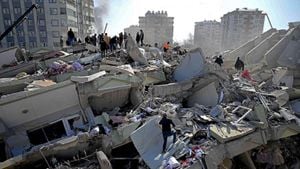Saudi Arabia's Vision 2030 is increasingly reshaping the economic and social fabric of the Kingdom, as the government pushes forward with ambitious reforms aimed at diversifying its economy away from oil dependency.
Launched by Crown Prince Mohammed bin Salman in April 2016, Vision 2030 serves as the roadmap for the Kingdom's transformation, emphasizing sustainable development, economic diversification, and improving citizens' quality of life. According to the Saudi Press Agency, the Crown Prince stated, "Vision 2030 is our roadmap for transforming the Kingdom's economy and society, guiding us toward sustainable success." This comprehensive plan is multifaceted, with updates continually rolling out to adapt to changing conditions and leverage growth opportunities.
At the heart of Vision 2030 lies the goal of reducing the Kingdom's reliance on oil revenues, which have long dominated its economy. This strategic pivot has led to the implementation of various initiatives intended to stimulate sectors like tourism, entertainment, and technology, which were historically underdeveloped. The Minister of Investment noted, "The transformation is necessary for the future to attract investments and improve the quality of life for our citizens," highlighting the drive to bring foreign capital and expertise to the Kingdom.
Vision 2030's blueprint encompasses creating job opportunities and fostering an entrepreneurial spirit among the youth, paving the way for economic resilience. Nabil Al-Amudi, speaking to Al Arabiya, emphasized the commitment to these efforts: "Our focus is on creating jobs, increasing the GDP, and empowering youth within Saudi Arabia." With these reforms, the government aims to develop the private sector, thereby reducing its dependence on state-owned enterprises.
Significant projects have already been initiated, with NEOM being one of the most talked-about developments. This high-tech city, projected to cost over $500 billion, is envisioned as a hub for innovation, sustainability, and tourism, representing the Kingdom's ambitions. Investors are showing strong interest, evidencing confidence toward the outlined economic changes.
The entertainment sector is also experiencing unprecedented growth. With the efforts to open cinemas, host international music festivals, and promote cultural events, the Kingdom is striving to position itself as a regional entertainment destination. These initiatives are seen as instrumental in uplifting the lifestyle standards of the Saudi populace.
Despite the ambitious ideals of Vision 2030, challenges remain. The Kingdom is grappling with integrating these modern developments within traditional societal norms, raising concerns among some conservative factions. Nonetheless, the government is progressively steering reforms with sensitivity to cultural dynamics.
Updates are frequent with Vision 2030, showcasing new regulations and initiatives announced at annual investment conferences aimed at showcasing the Kingdom as the new frontier for business and investment. The government continues to market its investment opportunities globally, thereby attracting multinational companies and investors seeking growth potential.
Integrative measures such as improving the quality of education, reforming labor laws, and enhancing work-life balance are also pivotal to fostering skills development, catering to future job markets. The educational reform aims to align with international standards, equipping Saudi youth with qualifications needed for competitive industries.
Challenges such as global economic uncertainties, regional geopolitical tensions, and the need for domestic reforms present hurdles to Vision 2030's implementation. The government acknowledges the need for adaptability and resilience as it navigates these challenges.
Looking forward, the success of Vision 2030 hinges on continued commitment and cooperation from both the government and the private sector. Expressing optimism, officials pledge to keep the momentum of this transformative initiative alive to secure the Kingdom's place on the global stage.
Saudi Arabia stands at a crossroads, with Vision 2030 offering hope for meaningful evolution of its economy and society. The continued evolution of this plan signifies not only the Kingdom's aspirations for sustainability and growth but also its commitment to global partnerships and modernity. Balancing tradition with innovation will be key as this ambitious vision moves forward, shaping the future of the Saudi Arabian populace.



